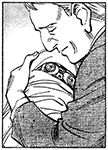|
I think I just fundamentally disagree. Or else am misunderstanding what you mean by objective. Nearly all fictive narration is subjective. It has an agenda. When I say 3rd person narrator, I don't mean an actual character telling the story, I mean regular 'ole narration. For example, I recently read Lord Jim at Home by Dinah Brooke. Every single character in that novel is described in the most disgusting, negative light possible. It is delightful. No one would call it objective. Another book I read recently: You Dreamed of Empires by Alvaro Enrigue. In that book, characters from 500 years ago speak with colloquial language and at the end, spoilering just in case, it turns out we're living in a dream Cortez had while tripping balls before Moctezuma broke his neck and repelled the Spaniards. I don't even know what objective would mean in that case. I don't think anything can be completely objective, but a 1st person narrator who wanted to demonstrate their objectiveness would have attributes like: the story is told later when they've had time to process, they provide supporting historical anecdotes, they bring up other characters' opinions and where they agreed and disagreed. I'm reading Free by Lea Ypi. It's a memoir but that doesn't matter, pretend it's made up. She does 1st person as-its-happening style where she is a child overhearing her parents use coded language and taking it completely at face value. Meanwhile, the reader is wondering, are they talking about prison camps?? Then an older version of the narrator steps in and says, They were talking about prison camps. And gives a brief history of prison camps in socialist Albania. I would never have doubted her authority even if Albania was made up. Stuporstar posted:When I see 1st person treated like a clear windowpane into the protagonist’s mind, so often these cases would be better served by switching to 3rd. Because then there’d be no need to call out such frequent slip ups like why their exposition is all telling the reader things they (the protagonist) already know and wouldn’t be actively thinking—y’know, if they’re not supposed to be “telling” the reader their story. And other clumsy poo poo like them describing how they’re positioning themselves in space like they’re unnaturally conscious of it all the time. And I’ve seen it so much. And these same people arguing that “1st is more intimate.” But instead it’s like they’re already writing like close limited 3rd person with the pronouns switched to “I”. You could argue that it can be done well if you fix those problems, but if you’re writing in 3rd, those problems simply go away—those weaknesses become strengths—so it’s another consideration when making that choice. This just isn't true! Of course that can work, but I don't know where you came up with "they're not supposed to be "telling" the reader their story." It's extremely common that that is exactly what a 1st person narrator is doing! Either directly addressing the reader or not. I recently read a collection of George Saunders stories and one great example is Escape from Spiderhead. 1st person, past tense, in which the narrator dies at the end (meaning, it is impossible for him to tell an actual person the story), that is probably 75% explanation of what he's doing in space. We accept this because we are willfully submitting ourselves to worlds made up of small letters and not questioning it too much.
|
|
|
|

|
| # ? Apr 27, 2024 19:55 |
|
i have no idea what this "readers expect 3rd person to be objective and historic" thing is about, if i am understanding this right. read V
|
|
|
|
cumpantry posted:i have no idea what this "readers expect 3rd person to be objective and historic" thing is about, if i am understanding this right. read V You’d be surprised how many readers do, just by default. It takes something like V to jolt them out of that assumption ultrachrist posted:I think I just fundamentally disagree. Or else am misunderstanding what you mean by objective. Nearly all fictive narration is subjective. It has an agenda. When I say 3rd person narrator, I don't mean an actual character telling the story, I mean regular 'ole narration. For example, I recently read Lord Jim at Home by Dinah Brooke. Every single character in that novel is described in the most disgusting, negative light possible. It is delightful. No one would call it objective. Another book I read recently: You Dreamed of Empires by Alvaro Enrigue. In that book, characters from 500 years ago speak with colloquial language and at the end, spoilering just in case, it turns out we're living in a dream Cortez had while tripping balls before Moctezuma broke his neck and repelled the Spaniards. I don't even know what objective would mean in that case. Yeah, I think you are misunderstanding because I agree that true objectivity is not real in narrative fiction (debatable if it’s something we humans can even claim to be). What I’m talking about is the illusion of objectivity that the reader assumes when reading a novel—I thought I made that clear with “pretends” to be objective. As you’ve just demonstrated, it takes more work for a 1st person narrator to firmly establish their claim to objectivity. While Severian’s eidetic memory claim in Book of the New Sun makes him even more suspiciously unreliable in a “doth protest too much” kinda way. Sure lots of readers read a 1st person novel without questioning anything the narrator claims, but 1st person lends itself to being questioned, by the nature that we’re less likely to trust people relating their tales—we’ve been conditioned not to. It’s a strength you can use to great effect. Whereas in 3rd person readers have been conditioned to just take things at face value, so it takes more effort to establish the subjectivity of the narrator, by doing exactly as you say—describing characters in an incredibly judgmental way and offering opinions. Creating devices or framing the story to throw that objectivity into question. It’s something that has to be broken on purpose or highlighted otherwise the reader is gonna take poo poo at face value. If you want them to take everything at face value, 3rd person is a dead simple way to just go ahead and do that. You can challenge these assumptions or use them to play to your strengths quote:This just isn't true! Of course that can work, but I don't know where you came up with "they're not supposed to be "telling" the reader their story." It's extremely common that that is exactly what a 1st person narrator is doing! Either directly addressing the reader or not. I recently read a collection of George Saunders stories and one great example is Escape from Spiderhead. 1st person, past tense, in which the narrator dies at the end (meaning, it is impossible for him to tell an actual person the story), that is probably 75% explanation of what he's doing in space. We accept this because we are willfully submitting ourselves to worlds made up of small letters and not questioning it too much. I think you’ve not been subjected to really bad YA or YA-like writing, because yes the self-insert protagonist is “not supposed to be telling their story.” People actually do write this poo poo with the assumption that the reader is just gonna insert their head into the protagonist and pretend they’re the one doing all the poo poo, and that the “I” of the story is the “I” of the reader. And it’s exactly as bullshit as you think it is Because of course the 1st person narrator is telling their story. It’s in forgetting that, or trying to deny that, that these writers make so many mistakes with the pov. That’s what I’m arguing with when I say it’s not supposed to be as immersive as a clear windowpane into the character’s head. Also with “explaining what they’re doing in space” you missed the modifier “like they’re unnaturally conscious of it all the time.” In too much detail, like a 3rd person narrator would “show, not tell,” rather than describing what they’re doing from an inside perspective. It’s just something I’ve noticed a lot in writers who take 3rd person writing advice and shove it into 1st without any consideration—like the said bad YA writers. As you say, it doesn’t matter if the 1st person narrator is telling their story to anyone. They’re still telling it. 1st person’s strengths tend toward “tell” while 3rd tends toward “show.” There’s no hard boundaries to this, but the balance scale tips more toward one than the other and you can stick your thumb on the scale in either way. Also I love Escape From Spiderhead Stuporstar fucked around with this message at 01:21 on Feb 29, 2024 |
|
|
|
I'm writing a story in first-person and the narrator making subjective judgements which leads to them misinterpreting things and getting things wrong is important to much of the story.Stuporstar posted:When I see 1st person treated like a clear windowpane into the protagonist’s mind, so often these cases would be better served by switching to 3rd. Because then there’d be no need to call out such frequent slip ups like why their exposition is all telling the reader things they (the protagonist) already know and wouldn’t be actively thinking—y’know, if they’re not supposed to be “telling” the reader their story. And other clumsy poo poo like them describing how they’re positioning themselves in space like they’re unnaturally conscious of it all the time. You're thinking about it way too much. You're thinking about it more than readers do. Sometimes the author needs to communicate important information to the reader. In a novel, the only medium for communication is the written word. If a first-person narrative should not include necessary exposition or spatial placement, what's the alternative you suggest? Is it completely wrong to ever use first-person narration, ever?
|
|
|
|
"whether you use first person narration" and "whether the narrator is telling the story in some specific circumstance that explains their narrative choices" are basically two independent questions. You can have a first person narrator who is retelling the story later, e.g. in an epistolary. You can also have a third person narrator who is speaking from a specific perspective, although that is not used as much in newer books. But generally speaking, I do think that first person narration signals "you are experiencing the story from the perspective of a specific person, and her take on the situation may be wrong", while third person narration signals a more neutral perspective.
|
|
|
|
Harrow the Ninth is one of the few books I know that's narrated in second person and it really works well into putting you into Harrow's dissociating mindspace.
|
|
|
|
Read more booksStuporstar posted:Yeah, I think you are misunderstanding because I agree that true objectivity is not real in narrative fiction (debatable if it’s something we humans can even claim to be). What I’m talking about is the illusion of objectivity that the reader assumes when reading a novel Assumes? Professor Kinbote wouldn't lie to me
|
|
|
|
Stabbey_the_Clown posted:I'm writing a story in first-person and the narrator making subjective judgements which leads to them misinterpreting things and getting things wrong is important to much of the story. This is cool and good. quote:You're thinking about it way too much. You're thinking about it more than readers do. Sometimes the author needs to communicate important information to the reader. In a novel, the only medium for communication is the written word. If a first-person narrative should not include necessary exposition or spatial placement, what's the alternative you suggest? Is it completely wrong to ever use first-person narration, ever? Nah. Thinking about it more than readers do is kinda the writer’s job lol. Don’t turn yourself inside-out getting all hyperbolic on me  Seriously though. What I’m saying is because in 1st person exposition is being told from the character’s perspective, it comes with their baggage. If you forget that and just blorp it out straight like you would in 3rd person, it tends to be clunky. So, think about their opinion about things, or how this thing you need to let the reader know emotionally connects to them. I don’t have my 1st person narrator just spell out, “By the way ya3ny means ‘I mean’ in Arabic, but we use it as a filler word like y’know.” But you see that a lot in not-well-written sff, and you see it even more in YA, and 1st person makes it really egregiously stand out. Good exposition is tied to the moment and it’s tied to the character. This is true regardless of pov, but in 3rd you can get away with just spelling things out without tying it to the character, just because the reader needs to know. In 1st person you gotta think a little bit more about why they’re saying or thinking poo poo. As for spacial placement, in 3rd person you can paint a whole picture about how a character is standing, what they’re leaning on or holding in their hand, if they have a nervous tick, etc. etc. But in 1st person, unless you have a reason for them to notice this—particularly about themself, like if they’re trying to control their nervous tick or whatever—otherwise you’re in danger of accidentally flying into 3rd person perspective. I’ve read writers going on and on like, “I was sitting in the stool leaning forward with my elbows on the bar, a whisky glass in hand making a ring on the lacquered wood as I tapped my foot to the music against the barstool’s foot. Blah blah blah etc.” And I’m like WHY? Why are you telling me all this? There’s no interiority whatsoever, like how the music makes them feel or what the whisky tastes like or if the stool is comfortable—it’s just 3rd person objective with “I” pronouns. That is the bad poo poo I’m talking about—excessive spacial description at the cost of what poo poo matters. Because in 3rd person, we’re not trying to read the protagonist from the outside. I’m not saying describing where the protagonist in space is bad. I’m saying please don’t do it like that, it’s awful. Even Raymond Carver, with his minimal interiority, knows how to balance interior/exterior. Like in that example from the link I posted earlier: quote:“The Naches? We always go there. Every year, at least once.” We sit on a bench in the sun and he opens two cans of beer and gives one to me. “How the hell was I to know anything like that would happen?” He shakes his head and shrugs, as if it had all happened years ago, or to someone else. “Enjoy the afternoon, Claire. Look at this weather.” Ending her careful observation of his actions with the thought “as if it all happened years ago” is doing a lot of heavy lifting because it’s so minimal. It’s not my style but I can appreciate how carefully balanced it is. There was a lot of careful thought behind every word he put down. It was intentional—vs the other example I paraphrased to protect the guilty that wasn’t intentional at all, just thoughtlessly procedural because the author was so focused on setting the scene like a movie, or describing who did what, that they gave no thought to the narrator’s perspective at all. Stuporstar fucked around with this message at 05:46 on Feb 29, 2024 |
|
|
|
Stuporstar posted:This is cool and good. This is why, for example, my black protagonist doesn't explain the AAVE language she uses casually. She does to a new character who has not spent time around black folk like this before so is getting the explanations--framing devices!--but she ain't bout to be like "bougie is a variation of 'bourgeois' that was modified in meaning the African American community, and high yellow discusses the skin tones various combined with an elevated sense of self and colorism." She's just gonna be like "so bougie mean you think you better than me, and high yellow mean you light skinned and think you better than me. " Nethilia fucked around with this message at 06:01 on Feb 29, 2024 |
|
|
|
Nethilia posted:This is why, for example, my black protagonist doesn't explain the AAVE language she uses causally. She does to a new character who has not spent time around black folk like this before so is getting the explanations--framing devices!--but she ain't bout to be like "bougie is a variation of "bourgeois" that was modified in meaning the African American community, and high yellow discusses the skin tones various combined with an elevated sense of self and colorism." Yes! And this kinda framing you need to do to make it sound natural. Like, as you say, characters explaining things the other characters don’t actually know (cause otherwise it’s the dreaded as-you-know-bob). Or having the character remember something important when it’s important to them, like finding their dead mother’s necklace and having a bunch of memories well up. Or having to recite some piece of history for an oral exam. Or talking about things like it’s everyday and letting the reader get stuff from context. There’s so many ways to weave information into the narrative, that just having the character think, “Oh yes, today is Exposition Day, where we all think quietly about the historical event that is so important to all of us. And I have been elected Prime Expositor and am expected to blah blah blah…” while they’re just sitting on page one eating breakfast. Not when you can go, “Oh poo poo, I forgot it’s Exposition Day!” instead. E. I wanna add to this (cause I’m hyperfixating lol) All these concerns don’t matter in the first draft. My first drafts make all these mistakes. They contain boring procedural action, focusing on details that don’t matter, badly done expository dialogue and just shoving in the info the reader needs to know with no consideration of character and voice. This is why my last edit is focused on voice. I’m not thinking about all of this all the time. I’m only thinking about it now, in the final draft, after a complete revision of stuff to get the plot events in the right order. And applying it to your writing is nowhere near as complicated as it seems (when I’m getting all philosophical about the art in this thread because I wanna have a discussion dammit.) There are actually only four criteria you need to do this kind of edit (for 1st person): 1. Does this sentence naturally come from the character’s pov or am I accidentally writing like it’s 3rd person? 2: Does the character have knowledge/talk about things they possibly could not have known? 3. Does my character have a reason to say or think this or directly tell the reader (if you’re acknowledging the reader exists, or another character they’re writing to etc.) and if not can I work it in more naturally? 4. Does this sound like my character or does it just sound like me? That’s it. It’s not that hard. But it’s a layer you don’t need to think about in your first draft, just get the story down. Stuporstar fucked around with this message at 22:20 on Feb 29, 2024 |
|
|
|
Stuporstar posted:There are actually only four criteria you need to do this kind of edit (for 1st person): These considerations are also applicable if you're writing in close/deep third. pidan posted:Hmm, it's like: Pronoun confusion can get difficult to manage in some cases but I will die on the hill that if it's not clear from the prose what perspective you're in, then the issue is not the choice of which perspective being used but one of voice. A scene written from Ann's viewpoint (whether in first or third) should not read the same as a scene written from Bea's viewpoint (whether in first or third) and both should be altogether different to the same scene written from a third (omniscient) narrator's perspective because that's at least three different voices.
|
|
|
|
Stuporstar posted:Seriously though. What I’m saying is because in 1st person exposition is being told from the character’s perspective, it comes with their baggage. If you forget that and just blorp it out straight like you would in 3rd person, it tends to be clunky. So, think about their opinion about things, or how this thing you need to let the reader know emotionally connects to them. Okay, now I understand what you were getting at.
|
|
|
|
Stuporstar posted:Yes! And this kinda framing you need to do to make it sound natural. Like, as you say, characters explaining things the other characters don’t actually know (cause otherwise it’s the dreaded as-you-know-bob). Or having the character remember something important when it’s important to them, like finding their dead mother’s necklace and having a bunch of memories well up. Or having to recite some piece of history for an oral exam. Or talking about things like it’s everyday and letting the reader get stuff from context. There’s so many ways to weave information into the narrative, that just having the character think, “Oh yes, today is Exposition Day, where we all think quietly about the historical event that is so important to all of us. And I have been elected Prime Expositor and am expected to blah blah blah…” while they’re just sitting on page one eating breakfast. Not when you can go, “Oh poo poo, I forgot it’s Exposition Day!” instead. Thanks for this. My first person book is about to go deep in the second draft and I now have a strong sense of who the MC is and I'm like "what else do they need to know about him?"
|
|
|
|
Current progress on Chapter 6: The day had turned to early evening, and the sun was setting over the Academy. Long, orange beams leaned through the windows as Rose followed a step behind her proctor, and he opened a side door to cut across the Academy's inner courtyard. Other students relaxing between classes or practicing their spells turned towards them and quickly parted out of the way. Some of them Rose recognized from her entrance tests, and more than one that failed to protect themselves from Black Fox's sword. She felt their eyes following them, and pulled her hood lower as she hurried behind him. One of those boys jumped out in front of Black Fox, and his fists glowed blue to create a large, studded shield. "I want a rematch!" Black Fox turned to Rose. "Kids think once they learn a few spells they can solve all their problems with magic. It's not power, nor technique. You need to study both." He then faced the kid and stepped closer to put his hand on his shield, and shoved him backwards onto his butt. "Your footing is off." He stepped over the boy and continued onward, while Rose helped him back to his feet before catching up with her proctor. "I don't think the other students here like you all that much," Rose said. "I'm not the bad guy. I just show them their limits." Black Fox replied.
|
|
|
|
Waffle! posted:One of those boys jumped out in front of Black Fox, and his fists glowed blue to create a large, studded shield. "I want a rematch!" Whose hand is doing what to whose shield?
|
|
|
|
Waffle! posted:Some of them Rose recognized from her entrance tests, and more than one that failed to protect themselves from Black Fox's sword. Some of them Rose recognized from her entrance tests; more than one had failed to protect themselves from Black Fox's sword. Some of them Rose recognized from her entrance tests, where more than one had failed to protect themselves from Black Fox's sword. quote:He then faced the kid and stepped closer to put his hand on his shield, and shoved him backwards onto his butt. quote:He stepped over the boy and continued onward, while Rose helped him back to his feet before catching up with her proctor. quote:"I'm not the bad guy. I just show them their limits." Black Fox replied.
|
|
|
|
Waffle! posted:Black Fox turned to Rose. "Kids think once they learn a few spells they can solve all their problems with magic. It's not power, nor technique. You need to study both." Something bothers me with this part, I think it's because saying "It's not power, nor technique" implies that those are irrelevant, but instead the next sentence is "it's both." Consider tweaking to add a qualifier. Something along the lines of: "It's not just raw unfocused power. Neither is it superior technique without force. Both power and technique are necessary." EDIT: The post below raises good points as well - probably better than my point. Stabbey_the_Clown fucked around with this message at 17:02 on Mar 9, 2024 |
|
|
|
The whole line feels like a non-sequitur to me. So, like, if I get the right balance of raw power and practiced technique, then can I solve all my problems with magic? I'm not even sure I understand what point he's actually making, but I would have written it more along the lines of: "'Kids think they can just learn a few spells and be masters of magic. It's not just about power. You need to study."
|
|
|
|
Waffle! posted:Current progress on Chapter 6: What's the primary purpose of this scene? Based on the limited information I have, I'm assuming it's to show how cool or tough the proctor/Fox guy is? If that's the case then he strikes me as overly verbose for the kind of archetype you seem to be aiming for. Turning to Rose to deliver a wicked bon mot before Doing Action saps the scene of inertia. Can't believe I'm about to say this, but the scene needs a healthy dose of 'show, don't tell'. Assuming this guy is meant to be the tough/distant/rusty-heart-of-gold mentor type, I'd consider rewriting to emphasize action and de-emphasize wisdom/witty quips. Additionally you're wasting world building and characterization opportunities with dialogue like "I want a rematch". Here's a quick pass to demonstrate these points. quote:One of those boys jumped in front of Black Fox's path, his fists glowing blue to create a large, studded shield. "Going somewhere? Let's see how tough you are without Professor Dinglydang backing you up."
|
|
|
|
Chillmatic posted:What's the primary purpose of this scene? Based on the limited information I have, I'm assuming it's to show how cool or tough the proctor/Fox guy is? If that's the case then he strikes me as overly verbose for the kind of archetype you seem to be aiming for. Turning to Rose to deliver a wicked bon mot before Doing Action saps the scene of inertia. Can't believe I'm about to say this, but the scene needs a healthy dose of 'show, don't tell'. It definitely depends. Like if the purpose of the scene is to show this Fox guy is the type to give sage advice (or friendly quips*) to the few under his wing he thinks is worthy and is hard on students until they’ve earned it—if Rose is in that position, the dialogue makes sense. But you’re absolutely right about breaking up the flow and explanations should come after he’s shocked her in the way you edited it. *Like the Master Corporal I had in basic (I’d joined the Reserves but flunked out on medical), was the type to be an rear end in a top hat on the job, but the rest of the time he was joking with new recruits and pointing and laughing with us at even fresher recruits going, “Haha look at those fuckin rat bags! You all used to march like that.” Stuporstar fucked around with this message at 19:08 on Mar 9, 2024 |
|
|
|
I appreciate the feedback and will make some changes. The scene is them moving to where the next character is working. The kid will jump out in Fox's way, and he'll just shove him over without stopping. "You can't focus on just magic skills and ignore the martial ones. You need to learn both." I agree with show, don't tell, and was going to have Black Fox and new character talking while sword sparring. It's dialogue, but at least things are happening during it. I'll try not to overdo it. My writer's group is mostly old ladies that don't read fantasy. They like my ideas and descriptions, but don't offer much for grammar help or what I should improve.
|
|
|
|
( continuing on, thanks for the input, etc. ) One of those boys jumped out in front of Black Fox with a battle cry, and his fists glowed blue to create a large, studded shield. Black Fox shoved him onto his butt without slowing his step. “Kids think they can solve all their problems with magic arts and ignore the martial ones. You need to study both.” Rose helped the boy back to his feet and then hurried behind her proctor. “I don’t think the other students here like you all that much,” She said. “That means I’m doing my job,” Black Fox replied. The two entered the opposite wing of the Academy building, to more long halls and doorways as far as the eye could see. Signs posted on the walls pointed to the cafeteria, teacher’s offices, student commissary, and other administrations. A stairwell led upwards to the dorms where most of the student traffic was coming and going from. They rounded a corner when Black Fox suddenly put his hand out in front of Rose, and she stopped to peek from under it. They witnessed the Marquis, tall and impeccably dressed, step out of a storeroom with a stack of blue, oblong boxes under his arm. He straightened his overcoat with his other hand and strolled away without a glance like he belonged there. Black Fox walked faster to the storeroom, and Rose ducked around him to step inside. The room was small and packed on either side with stacks of those blue boxes, all sealed and prepped for shipment. A few had been piled unevenly, and she poked with her boot to slide them back into place. The lid on the top box was tipped back against the rest of the stack, and Rose peeked rows of twisted, carved sticks inside before she slid it back into place. Wands! The only free space was a skinny aisle down the middle, which led to an opened countertop. Beyond that she saw a much larger room, with another opening at the back that led outdoors. The smells of wood shavings and sealing wax were prominent, and something burning wafted in from outside. The walls of the backroom were lined with hammers, pliers, and tools of all kinds that Rose didn’t recognize. Must be a workshop, she thought. Black Fox and Rose exited to a more flat and secluded side of the Academy campus, where a stone hut with a sloped roof and large, smoking chimney sat before them. A boy, not much younger than herself, emerged wearing an outfit of leather, thick gloves, and an apron, carrying a smoldering pot in metal tongs. He was on the short side, with dark hair, broad forearms, and a steady grip as he walked. He didn’t look like a student, and he wasn’t wearing the standard Academy uniform. The boy dipped the pot with a smooth, practiced motion and poured molten silver into a series of clay molds from one to the other without spilling a drop. Rose tilted her head as the shimmering liquid filled the molds and spread across them to curl into thin, flowery designs. Black Fox waited until he was finished before he approached, with his hand on the grip of his sword. “Rathus,” Black Fox started, “what was the Marquis doing with a stack of wands?” The boy set down his equipment, and his eyes followed Black Fox’s other hand at his sword. “Buying them,” he replied, and reached inside the doorway of the stone hut. Black Fox drew his longsword, the blade tall and thin like it’s owner. “Those wands are for the Academy.” “Which is why he pays double,” Rathus replied as he pulled out a sword of his own. It was short and wide with a slight curve to the back, an angled tip, and the guard bent in opposite directions. Rose had never seen different types of swords before, and until now thought they were all the just slabs of metal. She watched as the two took up their fighting stances; Black Fox with his body turned and sword pointed over his right arm, while Rathus held his sword out wider and tilted to his right. The way they moved and watched each other's position made Rose realize there was more to what they were doing than just staring each other down. Martial arts, like Black Fox said. They approached slowly, and circled each other for an angle of attack. Black Fox jabbed forward with a quick vertical strike, which Rathus tipped his blade to parry aside. He lunged with a few swings, but Black Fox stepped back and used the length of his sword keep distance between them. Rose studied their different styles as they circled each other and swung. Black Fox had the reach advantage of his longsword, while Rathus was better at redirecting strikes to slip into closer range. Their footsteps clattered on stone as the two went back and forth with a series of swings and deflections. “What do you think Evandal needs all those wands for?” Black Fox said as their swords clashed, ringing steel on steel off the Academy walls. “I was too busy counting his money to ask,” Rathus said. “He’s been the Academy’s best customer for months.” “The students need them more than he does,” Black Fox shot back, with a spin and swing of his sword that Rose was sure would have taken Rathus’ head off if he hadn’t ducked out of the way. Rathus’ short sword clanged against the longer one, and he dashed forward to rasp his blade down to its hilt. “Watch yourself, Fox. I’m not some First Year you can just swing at and bully.” He gave a twist of his sword to Black Fox’s, and jabbed the point towards his throat. Black Fox leaned out of the way just in time and the two backed off. Rose watched the young man and boy stare each other down, breathing hard until they came to some unspoken agreement to sheath their swords. She shook her head and figured there’s some things about boys she’ll never understand. “Is it over? Why are we fighting?” “I need the practice,” Black Fox said. “And I’m the only other person here who owns a sword,” Rathus added. -- I'm still noun > verbing too much, I think. I suck. BF is a lefty while Rathus is right, if their positioning seems weird their swords are on the same side. Waffle! fucked around with this message at 07:56 on Mar 14, 2024 |
|
|
|
Waffle! posted:[snip] Some general advice:
|
|
|
|
Fair enough. I need to give my main character a more active role in her own story. I already established how easily she can detect magic, and can use something like a ring of protective runes that the guys are sparring in. Instead of her just instantly recognizing them as such, she could be worried until the guys accidentally strike each other and the runes trigger. That way Rose and the reader could tell this is more of a spat than a real fight.
|
|
|
|
I've spent the past couple years writing video game reviews for fun on reddit, as well as mushy romances on another site. I've read the likes of McKee and How Not to Write a Novel to help recognize the pitfalls in the process of writing, and attended a group writing class before covid. After years spent dilly-dallying I've decided to aim for a modest draft of 50k, then further polish and expand as needed. The major plot points I've nailed down eons ago, I'm writing the chapters out of order depending on mood. Half planned, half written on the fly. The elevator pitch would be "Psycho in rural 80's Ireland." Despite being miserable, this isn't intended to be some Angela's Ashes shite (Got my degree in Limerick, and they hate Frank McCourt). It's simple horror entertainment. This 700 word work-safe piece is where I officially started, though it's meant to belong in a middle chapter, so it's the most polished to present. https://treacytown.blogspot.com/2024/03/ronan-looked-into-kitchen-mirror-as-he.html
|
|
|
|
Inspector Gesicht posted:I've spent the past couple years writing video game reviews for fun on reddit, as well as mushy romances on another site. I've read the likes of McKee and How Not to Write a Novel to help recognize the pitfalls in the process of writing, and attended a group writing class before covid. After years spent dilly-dallying I've decided to aim for a modest draft of 50k, then further polish and expand as needed. The major plot points I've nailed down eons ago, I'm writing the chapters out of order depending on mood. Half planned, half written on the fly. this is solid, no notes but i wrote a flash a while back that is amusingly similar and it's making me lol a bit, irish priests finding out something unearthly is a robust genre niche i guess
|
|
|
|
This story will go the complete opposite way. The Blair Witch crap will just act as smokescreen, the parts where I rip off The Shining will be for flavor, and the real menace will be the priest himself. Though thankfully he doesn't do anything that would make for depressing reading. I want Psycho, not Spotlight.
|
|
|
|
Inspector Gesicht posted:I've spent the past couple years writing video game reviews for fun on reddit, as well as mushy romances on another site. I've read the likes of McKee and How Not to Write a Novel to help recognize the pitfalls in the process of writing, and attended a group writing class before covid. After years spent dilly-dallying I've decided to aim for a modest draft of 50k, then further polish and expand as needed. The major plot points I've nailed down eons ago, I'm writing the chapters out of order depending on mood. Half planned, half written on the fly. You've got a real way of capturing perspective and appearance without dropping down to "his brown eyes were sad and miserable and also the clouds were crying" junk. I really like that. It's polished and very nice. Dear thread, you ever just want to unscrew your head and shake the words out? If I get another plot bunny, I'm going to choke on it.
|
|
|
|
All I know is that it's against the law to use the word ''cobalt" to describe someone's eyes.
|
|
|
|
He had beautiful kobold eyes. “What an attractive kobold,” I thought
|
|
|
|
Once you cracked open their cleavable igneous crust, the golem really did have the most beautiful cobalt eyes. Perhaps I had been taking them for granite.
|
|
|
|
DropTheAnvil posted:Once you cracked open their cleavable igneous crust, the golem really did have the most beautiful cobalt eyes. Perhaps I had been taking them for granite. You're not going to find their eyes in their cleavage, bud.
|
|
|
|
Fumblemouse posted:You're not going to find their eyes in their cleavage, bud. Jenova disagrees
|
|
|
|
Fumblemouse posted:You're not going to find their eyes in their cleavage, bud. Hah! I didn't think anyone could make a geographic pun about cleavage.
|
|
|
|
After Robert Jordan took the piss with a 100 page prologue, I've decided that the word "prologue" is now dirty. Chapter 0 here is intended as a short intro, with the following nine being six times as long and following the actual main characters. Nothing happens to this guy, he's just a background extra in a folk horror story. 950 words https://treacytown.blogspot.com/2024/03/keith-ducked-his-head-as-he-stepped-out.html
|
|
|
|
I'm finding my chapters to be real breezy. Not like, Patterson levels of short, but I'll need to go back on my second draft and better explain my character's motivations and stuff. My story might be better suited as YA/Teen, but I'm not sure. I'm just trying to get everything down on the page first. It feels like I introduce 2-3 characters each chapter, and then move on or keep only 1 of them.
Waffle! fucked around with this message at 17:36 on Mar 18, 2024 |
|
|
|
I'm kind of stumped on a start of a story I am working on. I really dislike the whole "SOMETHING BAD IS GOING TO HAPPEN" starts, but find myself written in a corner, relying on that same trope as a "hook" for my story. I find myself kind of stuck. I tried moving the story earlier, but find that its a false start. If I start the story later, I find myself in the middle of a large accusation scene, with the dynamic between the protagonist and the side character lost as we dive straight into drama and serious allegations/choices. How much patience do you think short-story magazine readers have? If I start off a great character dynamic, is that enough of a hook to get the reader to read on?
|
|
|
|
Without knowing your story, I would say, can you conceptualize your "starting off a great character dynamic" as a scene or vignette with a clear narrative arc? (Are they physically doing something?) Maybe think about it in musical terms--a sonata or concerto has a certain number of movements. The first movement may not directly, obviously share a theme or continuing melody with the second movement. But the composer feels like there is something about the connections or contrast between the two movements that is important. Both movements are enhanced by being part of the same larger piece; there are emotional reverberations, if nothing else (though in reality, there are probably shared motifs, or underlying rhythms, or key changes that connect the movements). So like, if it's just a scene of two characters sitting in a diner shooting the poo poo, for the sake of showing the reader what these two people's personalities are like, that's maybe less than ideal. But if the scene functions somehow as a contrasting episode, as complementary to the climactic scene, then it will feel important, even necessary. Because the goal is ultimately for every element of the story to feel somehow necessary, like it would be wrong to remove it. Cephas fucked around with this message at 05:25 on Mar 19, 2024 |
|
|
I just rediscovered this classic Ed McBain essay while trying to remember where I had heard the phrase "it beat polishing spittoons", and thought I would share. I particularly like the part about how to humanize cops.https://archive.nytimes.com/www.nytimes.com/library/books/032999mcbain-writing.html posted:She Was Blond. She Was in Trouble. And She Paid 3 Cents a Word. Being a writer is hard, but it beats polishing spittoons, right?
|
|
|
|
|

|
| # ? Apr 27, 2024 19:55 |
|
Flyerant posted:How much patience do you think short-story magazine readers have? If I start off a great character dynamic, is that enough of a hook to get the reader to read on? Just make the story give people a reason to read from the start. Sarah Pinsker's Two Truths and a Lie got a Nebula nomination, is utterly fantastic, and all it starts with is a character cleaning out the house of someone who died.
|
|
|




























